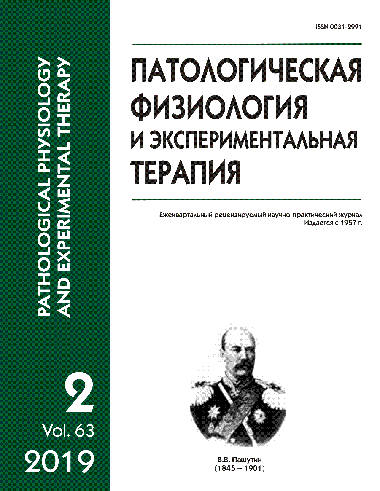The sulpiride correction of behavioral disorders in alcoholized white male rats with different degrees of depression
Keywords:
anxiety, depression, behavioral activity, alcoholism, dopamine
Abstract
The aim of the study was to evaluate correction of behavioral disorders with sulpiride, a dopamine autoreceptor inhibitor, in alcoholized rats taking into account individual typological features of the animals. Methods. Experiments were performed on sexually mature male rats weighing 180-220 g. The level of anxiety was determined in the elevated plus-maze by the total time of stay in and number of exits from the open space of the maze during 5 minutes of testing. Locomotor and exploratory activity and grooming behavior were assessed in the open field for 5 minutes. The severity of animal depression was determined using the standard Porsolt test by the number and total duration of immobility periods. The emotional state of animals was evaluated by the number of fecal boluses. After the initial (control) tests, the rats were divided into three subgroups based on the severity of depression as determined in the Porsolt test. Alcoholism was modeled by intraperitoneal injections of 10% ethanol (2 g/kg body weight) for 14 days. Then the animal behavior was re-tested. Sulpiride (Eglonyl, Sanofi Winthrop Industrie, France) was administered for 14 days at a dose of 10 mg/kg, intraperitoneally; then the animals were tested again. Results. Two-week alcoholization resulted in increased anxiety and depression of rats with low and medium depression degree at baseline. These disorders were evident from shortened stay of these animals in the open space of elevated plus-maze, reduced number of repeated exits from the open space, and a significant increase in the total time of immobility in the Porsolt test. The subsequent sulpiride treatment corrected the anxiogenic and depressogenic effects of alcoholism in male rats of these subgroups. Originally high-depressive animals did not show a sensitivity to the 14 day-administration of ethanol and subsequent inhibition of D2/D3-dopamine receptors in the elevated plus-maze and Porsolt test. Administration of ethanol for 14 days suppressed both the exploratory activity of rats in the open field regardless of their baseline degree of depression, and the locomotor activity of low-depressive animals. The subsequent sulpiride treatment did not abolish the effect of alcohol on the behavioral activity in the open field. Low-depressive alcoholized males developed a depression-like condition characterized by a marked behavioral deficit in the open field. The two-week alcoholization resulted in a significant (2-3.5 times) increase in the emotionality irrespective of the baseline degree of depression. This disorder was fully corrected by the sulpiride treatment in high-depressive rats and partially reduced the signs of emotionality in low- and medium-depressive animals. Conclusion. The study showed a possibility for correction of anxiety and depressive disorders induced by two weeks of modeled alcohol abuse with sulpiride depending on individual typological features of animals.Downloads
Download data is not yet available.
Published
27-05-2019
How to Cite
Frolova G. A. The sulpiride correction of behavioral disorders in alcoholized white male rats with different degrees of depression // Patologicheskaya Fiziologiya i Eksperimental’naya Terapiya (Pathological physiology and experimental therapy). 2019. VOL. 63. № 2. PP. 19–28.
Issue
Section
Original research






